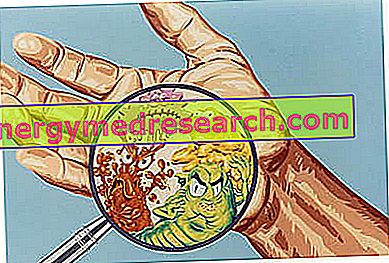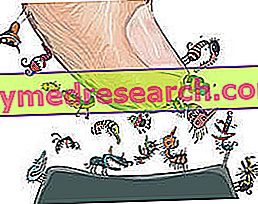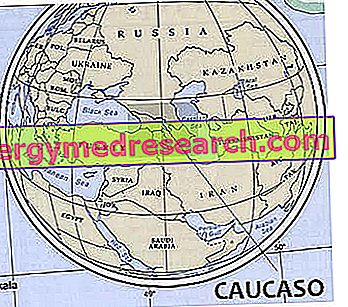Definition Colic is an access to abdominal pain, usually characteristic for site and irradiation, caused by violent contractions of a hollow viscus with smooth muscles. On the basis of the anatomical structure involved, intestinal, renal, hepato-biliary, appendicular, pancreatic, ovarian, gastric etc
Category dictionary
Definition and Types of Hemorrhage Hemorrhage means the leakage of blood from the vessels. Depending on the component involved, one can speak of arterial, venous, mixed and capillary hemorrhage. Arterial hemorrhage : the blood, bright red, comes out in the form of a jet more or less intense and synchronous with the heart beats; often the surrounding skin remains clean
What is the Essudato? The exudate is a liquid of variable consistency that is formed during acute inflammatory processes of various kinds, accumulating in tissue interstices or in serous cavities (pleura, peritoneum, pericardium). The exudate derives from the blood plasma which, following the inflammatory-dependent increase in capillary permeability, tends to escape and accumulate in the tissues
Etiology, or aetiology, consists of the study and research of the causes of a given phenomenon. In the medical field, in particular, the aetiology investigates the factors that can intervene in the origin of diseases, studying their importance and the possible relationships of interdependence. In many cases, in fact, diseases do not have a single cause, but a "multiple" or "multifactor" aetiology; in practice, this means that multiple causal agents (or etiological agents ) concur with the origin and evolution of the same
The etiopathogenesis is defined as the analysis of the causes and development of a pathology or an abnormal condition. The term derives from the union of "etiology" and "pathogenesis", which in the medical field indicate, respectively, the causal factors (etiology) and the mechanism of onset, and consequent development, of a pathological process (pathogenesis)
The term morbidity is generally used with the intention of expressing the frequency with which a given disease manifests itself in the population. In this sense, to say that a pathology is one of the most common causes of morbidity means to underline its wide diffusion in the population. By contrast, rare diseases are characterized by very low morbidity
The nosology or classification of diseases has as its object their logical and methodical distribution in a certain number of groups. This classification is performed according to similar or common characteristics, for example on the basis of the aetiology (causes of origin), of the pathogenesis (development of the disease and its consequences) or of the symptoms
The origin of the palliative term is traced back to the Latin words pallium , a Greek mantle also brought to Rome, and Palliare , which means covering with the pallium. The roots of this word make it easier to understand its current meaning; a palliative is in fact a remedy that reduces the symptoms of the disease, without intervening directly on the cause
The pathogenesis investigates the development of a disease and the chain of events associated with it, which step by step determine morpho-functional changes of the cells and tissues belonging to the affected organs. These alterations can be caused by chemical, physical, or biological agents (viruses, bacteria, etc
The adjective paucisintomatico is used to indicate the scarcity of symptoms with which a certain disease or anomalous condition is manifested. It is no coincidence that pauci , in Latin, means few; we can therefore use the terms paucisaccharides / oligosaccharides and oligosymptomatic / paucisymptomatic as synonyms synonymously
In common parlance, the term "Caucasian race" identifies white-skinned subjects. Johann Friedrich Blumenbach (1752-1840) was the first to claim that the origins of the white race were to be sought in the Caucasus region; the scholar came to this consideration on the basis of the legendary beauty of the inhabitants of these lands and on the harmoniousness of their skeleton (in particular of the skull)











